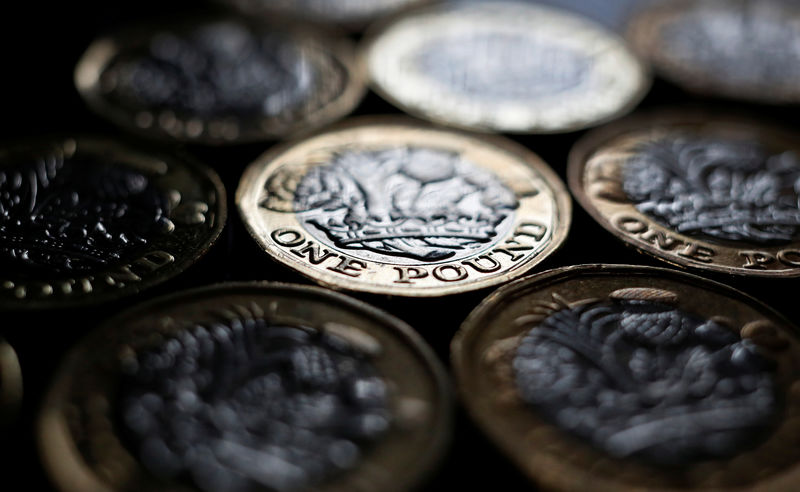(Bloomberg) -- The pound’s wild fluctuations are causing more distress for businesses already struggling under an unprecedented lockdown of the U.K. economy.
Sterling slid this month to lows not seen in decades against the dollar, before rebounding in its best week since 2009. That unpredictability wipes out expectations for a more stable year after Brexit, making hedging a costly challenge for firms.
“Businesses, especially small and medium-sized ones, need currency stability to manage cash flow and finances,” said George Vessey, Western Union’s U.K. currency strategist. “With Covid-19 rupturing financial markets and substantially weakening the pound, it makes planning forward hard for companies who need clear longer-term trends but constantly face these aggressive gyrations in currency rates.”
At the start of the year, following Boris Johnson’s resounding election win, most banks were bullish on sterling, with a median forecast compiled by Bloomberg projecting $1.35 by the end of 2020. Yet as the scale of the coronavirus’ economic impact became clear, the pound fell below $1.15 to the lowest since 1985.
John Smith, the director at laser equipment provider Scitec Instruments Ltd., encourages his customers to pay him in euros or dollars. He can then use those to pay his suppliers, avoiding a conversion to sterling. Nonetheless, the company can’t avoid foreign-exchange transactions entirely, making market timing key.
“When the pound strengthened slightly on Thursday I took the chance to transfer some dollars into pounds,” said Smith, who checks exchange rates several times a day. “The problem is the number of bank accounts I have now and the increase in book-keeping work.”
Pricey Options
Businesses that want to avoid whipsawing currency quotes by hedging their exposure are now faced with exorbitant costs. Gauges of volatility against both the euro and dollar for the next 12 months have touched the highest since the financial crisis, making options betting on the currency’s direction much more pricey.
“The large Conservative majority, lower volatility and reduction in hard Brexit headlines reduced the urgency to hedge” at the start of the year, said Phil McHugh, a trader at Currencies Direct Ltd, which provides foreign-exchange payment services to corporate clients. The rocketing volatility is “making any new hedges more tricky to plan for and enter into with prices moving quickly.”
The timing could not be worse. First, British companies with supply chains and customers in severely impacted regions, such as China and Italy, faced colossal problems. Now all U.K. citizens are banned from unnecessary travel, reducing consumer spending and putting more pressure on an already beleaguered domestic economy.
Although the government has committed to supporting businesses with emergency loans, getting access to them has proved difficult so far, with many concerned it won’t be enough to stave off a wave of bankruptcies.
A weaker pound can be good news for exporters, making their products comparatively cheaper abroad. But for importers, a poor exchange-rate can cripple business models, especially when British customers are being told to stay at home.
“The fall in the pound coupled with consumer demand putting the brakes on has been a double whammy for businesses to deal with, especially importers,” said McHugh. “This crisis has exploded in severity very quickly. The fact that consumer demand is grinding to a halt is making it very difficult for businesses to look ahead and accurately pin down what their future requirements will actually be.”
Profits Exposed
It’s not just smaller companies, with less sophisticated financial operations, at risk of severe currency fluctuations. Some listed companies choose not to hedge, leading to massive swings in their performance depending on exchange rates at the time of conversion.
FTSE 250 recruitment firm Hays Plc is particularly exposed to moves in sterling’s cross with the euro. For each 0.01 pound movement in exchange rates against the shared currency, Hays’ operating profit is impacted by 1.2 million pounds ($1.4 million), according to finance director Paul Venables in a earnings call last month.
Some companies may end up gaining from sterling’s slide. The aerospace sector has been hit hard by the coronavirus, a situation exacerbated by many airlines locking in high oil prices before crude went into freefall. Yet for those who hedge from dollars into sterling, such as Rolls-Royce Holdings Plc (LON:RR), getting more pound for each buck could provide a much-needed boost.
“Just as the slower growth in the fleet might bite, in comes more favorable foreign-exchange,” said Sandy Morris, an aviation analyst at Jefferies in London.
Either way, it’s a minefield for those charged with managing finances for the year ahead. With the risk of the pound falling further toward parity against the dollar, the question for those reliant on a strong pound is whether to hedge their bets now or bank on a return to earlier levels once the virus threat dissipates.
“Sterling’s aggressive decline shows how unattractive the currency is compared to other safe haven and more liquid currencies,” said Western Union’s Vessey, who thinks the pound’s recent rebound may only be temporary. “Just imagine what it feels like for SME business owners, or a finance director at a corporate firm, having to make judgments around currency payments in this environment?”
©2020 Bloomberg L.P.
